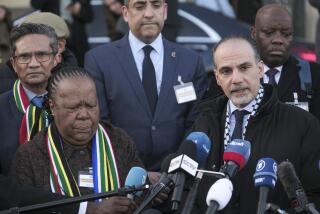S. Africa Admits It Broke Treaty : Says It Armed Rebels After Mozambique Pact
- Share via
JOHANNESBURG, South Africa — Despite its nonaggression treaty with Mozambique, South Africa has continued to support the right-wing, anti-government rebels of the Mozambique National Resistance with weapons and ammunition, other air-dropped supplies and transport, South African Foreign Minister Roelof F. (Pik) Botha admitted Wednesday.
After months of disputing Mozambique’s charges that South Africa was guilty of gross violations of the March, 1984, Nkomati Accord in its support of the rightist Mozambique National Resistance, Botha acknowledged, “The (Mozambican) allegations in broad terms are correct, and the Nkomati Accord was violated.”
The admission, further damaging South Africa’s image as a trustworthy partner in international affairs, appeared to be motivated by the expectation that Mozambican President Samora M. Machel will lay extensive documentary evidence of the violations before President Reagan today, when they meet at the White House.
Despite criticism from American conservatives, the Reagan Administration is supplying Machel’s Marxist regime with $40 million in economic aid, as part of an effort to lure Mozambique from the embrace of the Soviet Union.
The Nkomati Accord, brokered behind the scenes by American diplomats and one of the few clear successes of the Reagan Administration’s policy of “constructive engagement,” is now very much in doubt. However, Botha indicated that a major effort is under way to salvage it and restore some trust between Mozambique and his country.
On Monday, South Africa violated an agreement, also the result of U.S. mediation, with another neighbor, Angola, by sending troops across the border in pursuit of Namibian guerrillas of the South-West Africa People’s Organization.
Botha, speaking with senior South African journalists in Pretoria, implied that the country’s military forces, which had built up the Mozambique National Resistance into a 15,000-strong guerrilla force before the Nkomati Accord, were solely responsible for the violations. Gen. Magnus Malan, the defense minister, had accepted responsibility for the actions, Botha said.
The continued South African support had included the supply of weapons and ammunition on a regular basis, establishment of a communications network, deliveries of “humanitarian aid,” including food and medicine, either by land or air, construction of landing strips and other facilities at the guerrillas’ bases and air and sea transport, including at least one trip by submarine, for guerrilla leaders, Botha said.
In addition, Louis Nel, the deputy foreign minister, made three secret visits over the last three months to the guerrilla headquarters at Gorongoza in central Mozambique, although such contacts had been explicitly denied, both publicly and in diplomatic meetings with Mozambique.
The guerrillas’ attacks, apparently mounted with South African support, have virtually paralyzed Mozambique for the past year, cutting off the capital and major cities from the countryside and preventing the shipment of food and consumer goods. Until it received help recently from Zimbabwe, the government had been unable to check the spread of the insurgency.
Extensive Evidence
South Africa has consistently denied all allegations of such activities, except for some clandestine support that five army officers had given to the rightists.
But Mozambique found extensive documentation--including a senior officer’s operational diary, headquarters day books, itineraries of officials’ trips to South Africa over the past two years, radio logs, and supply records--when its troops, supported by Zimbabwe forces, overran the guerrillas’ headquarters at Gorongoza in central Mozambique late last month.
All these amounted to no more than “technical violations” of the Nkomati Accord, Botha said, despite treaty prohibitions on supporting guerrilla operations against one another. They occurred, moreover, according to Botha, as a result of South Africa’s attempts to bring the right-wing rebels into negotiations with the ruling Front for the Liberation of Mozambique, as South Africa had pledged to do.
More to Read
Sign up for Essential California
The most important California stories and recommendations in your inbox every morning.
You may occasionally receive promotional content from the Los Angeles Times.












